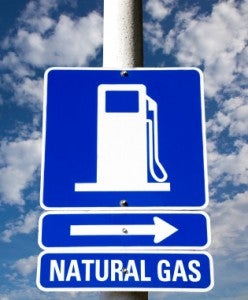Are Natural Gas Vehicles Good For Climate Change?

Last week, in a speech in Las Vegas, President Obama called for getting more natural gas vehicles (NGVs) on the road in the United States. NGV proponents applauded the speech and immediately reiterated the conventional wisdom that because natural gas burns cleaner than gasoline or diesel, NGVs lead to reduced greenhouse gas emissions. However, recent science shows that the conventional wisdom may not be right.
While it is clear that the actual combustion of natural gas is cleaner than the combustion of gasoline or diesel, there are other emissions associated with the production, delivery and use of those fuels. Natural gas is essentially methane, a potent greenhouse gas. Over 2o years, a pound of methane is 72 times more potent than a pound of carbon dioxide. As natural gas is produced and piped across the country, there are plenty of opportunities for it to leak into the atmosphere. EPA estimates that leak rate to be somewhere between 2-3%, but the exact amount is the subject of much debate.
What we do know is that whatever the percentage of methane that is lost to the atmosphere, it erodes the climate benefits of combusting natural gas. In other words, the higher the leak rates the less the benefits. If leakage is high enough, NGVs can actually be worse for climate for some period of time. A newly published study concluded that over 20 years, NGVs were worse for the climate than gasoline or diesel vehicles unless current leak rates are reduced. With current leak rates, even after 100 years NGVs are no better for the climate than gasoline or diesel vehicles.
Because methane is more potent over shorter time frames, if we remove more methane now, we can reap quick benefits for the climate system. However, if we emit more methane now, it will have a greater negative impact on the climate system. This may be precisely the outcome we get if we aren’t careful in how we proceed with NGVs. Before large-scale policies encouraging NGVs are written into law, we should better understand the leak rate of methane from the natural gas supply and take actions to ensure it is low enough that putting more NGV on the road does not harm the climate. Understanding and reducing leak rates is critical to accepting NGVs as a legitimate GHG strategy. EDF is working to do this, but until we have better data and see an industry committed to reducing leaks, we will reserve judgment on whether the President’s call for accelerating NGVs is justified.










